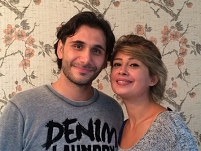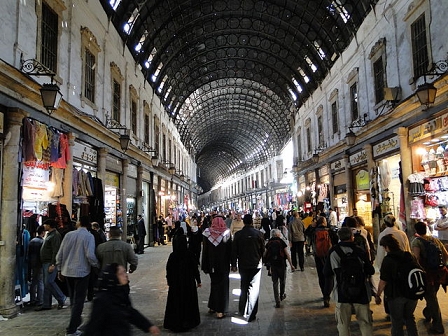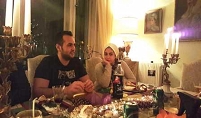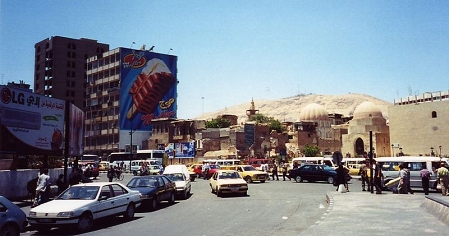Erstellt am: 11. 3. 2016 - 19:43 Uhr
Voices from Syria
Saturday Reality Check
Voices from Syria, a Reality Check Special this Saturday, starting at 12 noon.
This month marks the fifth anniversary of the Syrian conflict.
In five years of civil war 250,000 people have been killed and some 11 million have been driven from their homes.
Reality Check decided to mark the occasion, not by talking about the war and its complexity, or the different geopolitical forces at work, but by hearing the voices of people from Syria, presenting a narrative of the lives people were leading before the country was torn apart by the war.
We invited Syrian people who are now living in Austria to think back to this time five years ago, and to tell us what their lives were like back then, where they were, what they were doing, and what their hopes and plans for the future were.
- Saad and Oula
"It was dreams and hopes, actually, for me, at that moment. In February I was making a workshop with a British director called Tim Saville. Ee were preparing a performance, a big play, it was actually like six hours long. The first performance was in Ireland, and then we gave another performance in Canada, and it was a blast. At that moment I was so excited. I had graduated from the academy of theatre five years before, and I was like "this is my time. Now I’m going to do something."
"This day I was working in Syria, in Damascus. I was full of dreams of making changes in Syria for freedom. The [Arab] spring was coming. After six months, all our hopes were destroyed. I began working with the Red Cross, with the refugees in Damascus from the other cities in Syria. It was a very difficult time, because of my family. My brother was arrested because he was against the regime. They said he made a protest, but he didn’t. Anyone could report you, and you’d be gone.
"It seems it was enough to be against the regime to be arrested. All the time, Saad and I, especially me because of my last name, at every checkpoint we were asked a lot of questions. It began to feel unsafe. When my brother got out of jail, he went to America.

Saad & Oula
"When I remember those days, I always have the feeling that I always wanted to leave Syria, before the revolution, before the war. But during those events, the idea of the [Arab] Spring coming, you felt hope. And I was scared, Oula and I, we didn’t protest, we didn’t go on the streets, we were so afraid because you don’t know who might see you and report you, and we have a kid, he was four years old then. At that moment, we felt that we wanted to stay in Syria.
"We felt that it was our role to stay in our country, to stay in Damascus, especially as I was working with the Syrian refugees. I tried to write many play scripts about what was happening in Syria. We had high hopes that there would be change and democracy.
"Now it’s a laugh. We were idiots.
"I remember, I was with my brothers, and I heard the voices of the men and women, and they were shouting, “Freedom, freedom, freedom!” I started crying, I don’t know why. All the time I said, “Please, God, protect them!” It was a huge moment. It was forbidden for us to say the name of the president, we whispered his name, like he was the most terrible person you can imagine. So imagine the moment when everybody was suddenly shouting and cursing him in the streets. It was like, "What is that? What is happening?" Suddenly everyone is not afraid of him. So I felt, if I were him, I would leave. But he didn’t, and he survived. And this is against the nature of good and bad, it’s like there is something wrong, where is the justice?"
- Jimy
"I was working in a radio station called "Melody FM". It exists not just in Syria, but also in Egypt, in Jordan and in Lebanon. It is a famous Arabic radio station. I started working as a DJ, I was 17, I was at school. I liked this job, because a lot of people call and ask for a lot of songs, and there was a lot of chatting, every day.
"In 2011 I started working in the dubbing department, on a lot of Turkish series, and Iranian series, and Russian series, we make them in Arabic, synchronizing the original one and the Arabic one, building soundtracks. It was really good. I had my small apartment, but I always went to the family house.

CC BY-SA 3.0 Bernard Gagnon via Wikicommons
"We had everything before the war. We had clubs, we had restaurants where we went every day to eat, and always, always you had something to do, every day. You don’t have routine in Syria, at least not for me. Every day I had a lot of things to do, also my work, my studying, it was really cool. But after that, the war started. There were a lot of clubs in Damascus, but now the people have changed and they don’t go because of the situation. But before that we had about 50 clubs, just in Damascus, you could hear all kinds of music, rock, Arabic, house, electro, and all kinds.
"I was thinking [back then] about opening my own project, my own studio, and start working alone, or with my friends. I still have those dreams, but I stopped working in 2013, so it’s a little bit hard, because everything, my hardware and my software, is in Syria.
"It’s hard for me to start again, but I think I will do it. I am searching for the right way to do it. Maybe this year, maybe next year, I will find the way to do it and will start again. I hope so."
- Massa & Abood
Massa tells me that she was in high school when the demonstrations started and later went to university to study Arabic literature. She also wanted to study English so that later she would be able to work translating Arabic into English. So Massa joined an English course and that was where she met Abood, who she would later marry. The couple laugh and joke about how Massa always did Abood’s homework because she was better at grammar, and Abood was good at conversation, so he did all the talking in class.

Abbod & Massa
Both Abood and Massa describe with nostalgia the regular family gatherings on Fridays to share a meal. "The Arabian family is very big!" says Abood with smile, and then Massa points out that her family is bigger - around 50 people would get together at her aunt’s house, all generations. Abood’s grandparents didn’t like smartphones so the evenings would be full of discussion and traditional games.
Now many family members have fled, some to countries like Germany and Sweden. The war has also split the family politically, say Abood: "When they meet, they fight. My cousin supports the government and another one supports the revolution".
When we began our interview Massa and Abood were in a lighthearted mood, laughing at some of the stories they are telling me. But later it becomes more somber, as they explain that older members of their families are still in Syria, either because they aren’t physically strong enough to make the journey, or because they stay to look after elderly relatives. Massa tells me her grandmother is in Syria because she says, she doesn’t want to die crossing the sea in a rubber boat. "She wants to die in her home".
When I ask about hopes for the future, Abood replies "I dream to have a safe life. I don’t want to dream a big dream, but I hope to have a job and for my kids to go to school, to learn and be able to study, that’s my dream now". For Massa, her dream is that "all my family [get] together, and I [see] my mother and my dad, and my sweet brother. After that, if everything [is okay] in Syria, I want to go back because it’s my city, my life".
Dieses Element ist nicht mehr verfügbar



